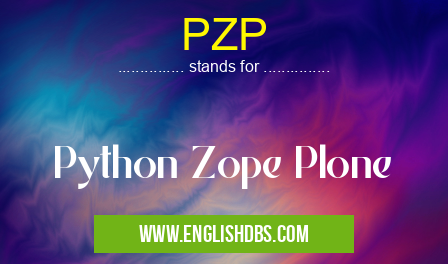What does PZP mean in UNCLASSIFIED
PZP is an acronym that stands for Python Zope Plone. It refers to a stack of open-source software components commonly used for building and managing web applications, especially in the context of content management systems (CMSs).

PZP meaning in Unclassified in Miscellaneous
PZP mostly used in an acronym Unclassified in Category Miscellaneous that means Python Zope Plone
Shorthand: PZP,
Full Form: Python Zope Plone
For more information of "Python Zope Plone", see the section below.
Meaning of PZP
1. Python:
Python is a general-purpose, interpreted programming language known for its readability, simplicity, and versatility. It is often used as the core language for web development frameworks.
2. Zope:
Zope is an open-source, object-oriented application server written in Python. It provides a framework for building and deploying web applications and includes features such as object-oriented programming, component architecture, and database integration.
3. Plone:
Plone is a content management system (CMS) built on top of Zope. It provides a comprehensive set of features for creating, managing, and publishing web content. Plone is known for its flexibility, extensibility, and user-friendliness.
Benefits of Using PZP
- Rapid Development: PZP simplifies the process of building web applications by providing a pre-built stack of components and tools.
- Scalability: Zope and Plone are designed to handle high traffic and large-scale deployments.
- Extensibility: The PZP stack is highly extensible, allowing developers to customize and add functionality through plugins and add-ons.
- Community Support: The PZP stack has a large and active community, providing support and resources for developers.
Essential Questions and Answers on Python Zope Plone in "MISCELLANEOUS»UNFILED"
What is PZP?
PZP stands for Python Zope Plone, a full-stack web application framework that combines the power of Python, Zope, and Plone. It allows developers to create complex web applications quickly and efficiently.
What are the key benefits of using PZP?
Using PZP offers several benefits, including ease of development, flexibility, security, and a rich ecosystem of add-ons and extensions. It enables rapid prototyping, supports object-oriented programming, and provides built-in security features. Additionally, PZP benefits from an extensive community and a wide range of resources.
What types of applications can I build with PZP?
PZP is suitable for developing various web applications, including content management systems, social networking platforms, e-commerce websites, and enterprise-level applications. Its versatility makes it adaptable to a diverse range of project requirements.
Is PZP a good choice for beginners?
While PZP offers a robust framework, it may not be the most intuitive option for beginners. It requires some prior knowledge of Python and web development concepts. However, the extensive documentation and community support can assist beginners in learning and using PZP effectively.
How does PZP compare to other web frameworks?
PZP distinguishes itself by its content-centric approach, making it particularly well-suited for content-heavy applications. Compared to frameworks like Django and Flask, PZP provides a more comprehensive suite of features out of the box, including user management, content editing, and workflow management.
Final Words: PZP is a powerful and versatile software stack for building and managing complex web applications. By combining the strengths of Python, Zope, and Plone, PZP provides a comprehensive solution for developers seeking a robust and extensible platform.
